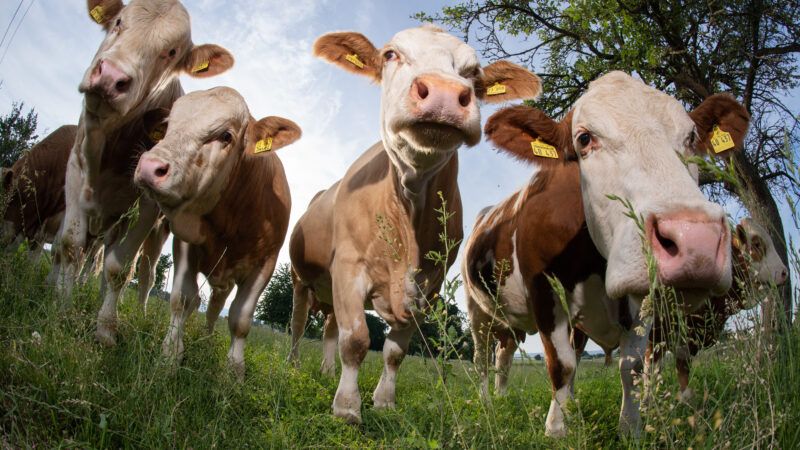PRIME Cuts: Bill Would Slaughter Federal Regs on Small Meat Processors
COVID-19 has exposed the problems of a centralized food supply and built momentum for sweeping deregulation of the meat industry.

Lawmakers in the House and the Senate filed joint bipartisan bills last week reintroducing legislation that would decrease federal regulation of meat production. This would decentralize the food industry and make it easier for small local meat producers to compete with larger firms.
The Processing Revival and Intrastate Meat Exemption (PRIME) Act is sponsored by Reps. Thomas Massie (R–Ky.) and Chellie Pingree (D–Maine) in the House, and by Sens. Mike Lee (R–Utah), Angus King (I–Maine), and Rand Paul (R–Ky.) in the Senate. As currently advertised, the two bills have 39 co-sponsors in total. The majority of the co-sponsors are Republicans, but include a few Democrats in agricultural constituencies, like Reps. Jared Huffman (D–Calif.), Darren Soto (D–Fla.), and Joe Courtney (D–Conn.).
The bill would remove the requirement that all slaughterhouses be subject to U.S. Department of Agriculture (USDA) rules and inspections. Instead, it would be up to states and towns to set their own rules for slaughtering livestock.
As Reason's Baylen Linnekin noted when the PRIME Act was first introduced in 2015, and again in 2017, large meat producers selling across state lines would still be subject to USDA regulations, but this legislation means that small local producers selling meat within their states would have significantly less red tape to wade through when trying to serve their communities.
USDA-inspected slaughterhouses are few and far between, which means that local and corporate farmers alike often have to travel hundreds of miles to the nearest facility. There are only 86 "approved immediate slaughter facilities" in the United States. There are only three in the whole state of California, and none in my home state of Vermont.
This poses a huge financial burden for small farms, which have to resort to legal loopholes to get around regulations. Under current law, although it is illegal to sell meat from a non-USDA facility, it is legal for a small farm to sell you an animal—or a share of an animal—and kindly "offer" to slaughter it for you at a non-USDA slaughterhouse.
"I have a small cattle farm, and I've used both types of processing facilities—USDA and custom [not USDA] processor," Massie tells Reason. "Nobody has ever gotten sick from a cow I've sold them and gotten slaughtered at a custom place, and I can't see how they'd get sick from me selling them a hamburger slaughtered at the same place.…The PRIME Act is really just expanding this exception."
Massie also notes that custom slaughterhouses are still subject to local health regulations and surprise inspections just like a restaurant or a grocery store. Why do we let them cut up and sell meat, but bar farmers using these facilities from doing the same?
The PRIME Act would allow local grass-fed beef to be competitive with large-scale grain-fed beef. Even though grass-fed is more expensive to produce, if producers could get rid of the shipping overhead from transporting animals to USDA facilities, they could cut costs.
"When you buy beef at Kroger in Kentucky, the cow was probably raised in Kentucky, flown to Nebraska for processing and packaging, and sold back to Kentucky," says Massie. "We want Kentucky to be able to feed Kentucky."
This legislation is timely as the market for locally produced meat has only continued to grow since the bill was first introduced. And as Reason noted last year, pandemic shortages have revealed the limits of a centralized meat industry, which relies on big producers. This faulty system is reinforced by the mountains of regulation that push out local farms.
Fortunately, it seems that people in Congress from both sides of the aisle are taking note.
"The pandemic exposed serious problems in our supply chain—from toilet paper to cars to the meat in our grocery stores. Coupled with the recent ransomware attack on the world's largest meat company, it's clear that relying solely on industrial-scale meat processing is a liability," said Pingree in a statement on her website. "Congress must act to make it easier for local farms to compete with these big meat companies and make locally raised livestock processing more widely available."
"During COVID, we doubled the number of co-sponsors for the bill overnight," says Massie. He sees this as a breakthrough that has shown his colleagues that the current centralized agricultural system is broken. "Some Democrats are starting to understand that we can have greener, safer, and healthier meat if we have size-appropriate regulations."
Democrats should also be happy about the environmental benefits of such a bill. It would incentivize farmers to sell locally, decreasing the amount of energy expended on transportation.
Pingree tells Reason that she believes the sponsors don't accurately represent how many Democrats would be for the bill. "It's not a bill that's on everybody's radar screen," says Pingree, "but there are a number of progressive colleagues of mine, who if I sat down and explained the bill, would be in favor of it."
Massie sees the PRIME Act as a way to return the USDA to its constitutional limits, and give control back to states and localities. Massie believes that according to the Constitution, the federal government is only allowed to regulate "interstate commerce." That should mean the USDA can only regulate meat that is being sold outside of state lines.
"[The bill] should be constitutionally obvious," says Massie. "It's actually constitutionally redundant."


Show Comments (33)